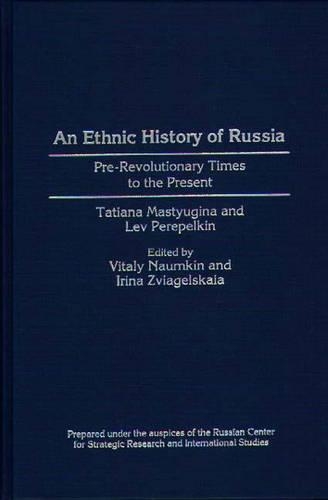
An Ethnic History of Russia: Pre-Revolutionary Times to the Present
(Hardback)
Publishing Details
An Ethnic History of Russia: Pre-Revolutionary Times to the Present
Bloomsbury Publishing PLC
Praeger Publishers Inc
25th November 1996
United States
Classifications
Tertiary Education
Non Fiction
European history
Social and cultural history
Anthropology
947.004
Physical Properties
Hardback
264
Width 156mm, Height 235mm
595g
Description
From its beginnings Russia has been a polyethnic society, and so has a long history of dealing with ethnic problems. From its imperial stage through the Soviet years it has experienced the pressures of ethnic assimilation and ethnic nationalism. In recent years, political liberalization and economic turmoil have released pent-up nationalistic and separatist feelings which had lain dormant through the Communist regimes. This study presents an ethnic history of Russia, placing present-day turmoil in the context of Russian history. The authors analyze inter-ethnic relations in Russia and provide a detailed description of the key ethnic groups. They also look at the evolution of ethnic structure and the current ethnopolitical movements in different regions of Russia. Consequently, the study points the way to future inter-ethnic relations in Russia and, indeed, the future of the Russian Federation.
Reviews
If you want to find a reference book on major nationalities and ethnic problems of the present-day Russian Federation, this work wil be your right choice. ...as a guide book on the current ethnopolitical situation in the Russian Federation, An Ethnic History of Russia is a valuable addition to the existing literature on Russia's nationalities. The general character of the work and its readable language may make it a good supplementary text for undergraduate and graduate history and political science courses.-Canadian Slavonic Papers, Vol 39, #3-4, 1997
"If you want to find a reference book on major nationalities and ethnic problems of the present-day Russian Federation, this work wil be your right choice. ...as a guide book on the current ethnopolitical situation in the Russian Federation, An Ethnic History of Russia is a valuable addition to the existing literature on Russia's nationalities. The general character of the work and its readable language may make it a good supplementary text for undergraduate and graduate history and political science courses."-Canadian Slavonic Papers, Vol 39, #3-4, 1997
Author Bio
TATIANA MASTYUGINA is a researcher with the Institute for the Economy in Transition of the Russian Academy of Sciences in Moscow. LEV PEREPELKIN is a senior researcher with the Institute of Oriental Studies of the Russian Academy of Sciences in Moscow. VITALY NAUMKIN has been the President of the Russian Center for Strategic Research and International Studies since 1991. He was a professor at Moscow University until 1984 and then moved to the Institute of Oriental Studies, Russian Academy of Science where he was Deputy Director. He is the author and editor of numerous works on the history, ethnography, and religion of the Middle East, Central Asia, and Russia. His publications include The Island of Phoenix, Central Asia: State, Religion and Society (ed.), and Central Asia and Transcaucasia: Ethnicity and Conflict (ed., coauthor). IRINA ZVIAGELSKAIA is Head of the Sector of Regional Conflicts at the Institute of Oriental Studies, Russian Academy of Science. Since 1991 she has been Vice-president of the Russian Center for Strategic Research and International Studies and a department head at the Institute of Oriental Studies. She is the author of articles and books on conflicts in the Middle East, and post-Soviet territory, including The U.S. Policy towards Conflicts in the Middle East, Central Asia and Transcaucasia: Ethnicity and Conflict (coauthor), and The Russian Policy Debate on Central Asia.
